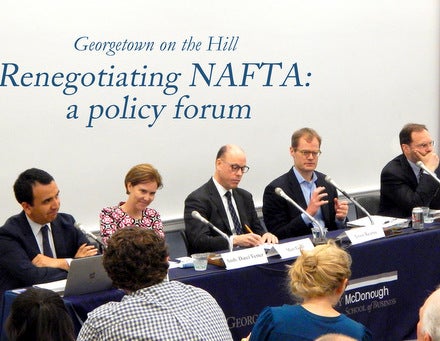CBPP hosts policy forum on the renegotiation of NAFTA
Posted in News | Tagged News - International Trade

On April 19, in the Rayburn House Office Building, the Georgetown Center for Business and Public Policy hosted a Georgetown on the Hillpolicy forum on the renegotiation of NAFTA moderated by J. Bradford Jensen, Senior Policy Scholar, Georgetown Center for Business and Public Policy and McCrane/Shaker Chair in International Business, McDonough School of Business. Expert panelists included:
- José Díaz Briseño, Washington, D.C. correspondent, Reforma
- Matt Gold, Adjunct Professor of Law, Fordham University School of Law, former Deputy Assistant U.S. Trade Representative for North America
- Jason Kearns, Chief International Trade Counsel, Committee on Ways and Means in the U.S. House of Representatives – Democratic Staff
- Ambassador Darci Vetter, former Chief Agricultural Negotiator, Office of the U.S. Trade Representative
In a dynamic, open forum including audience Q+A, the panel of experts offered insights into how NAFTA renegotiation might proceed. Jason Kearns discussed that the Administration has recognized that it needs Congress to approve a renegotiated NAFTA and so is following the trade promotion authority (TPA) process to gain that approval, along with what the TPA process entails. Matt Gold continued discussion of the legal frameworks and of the complexities of the agreement and applicable statutes that implement it. Darci Vetter highlighted the agricultural sector and the related negotiation process and strategies, reminding that how the mandate/modalities are defined has a huge bearing on the outcome. José Díaz Briseño offered a Mexican perspective on the pending renegotiation and remarked on changes that would appear to demand much of the Mexican government and affect Mexico’s economy.
Media Coverage
Former USTR official warns U.S. approach to NAFTA could backfire against U.S. agriculture (new window), Inside U.S. Trade by Jenny Leonard (April 20, 2017)
Darci Vetter, chief agriculture negotiator for the Office of the U.S. Trade Representative during the Obama administration, this week cautioned President Trump’s team to seek a more measured approach to NAFTA talks and warned that a failure to do so could backfire against the U.S. agriculture industry in particular, making it an easy target for retaliation. Vetter, speaking at an April 19 event hosted by Georgetown University, said despite the negative rhetoric about NAFTA in many other sectors, the administration and members of Congress “have sent some signals to the ag community that it’s not really on the chopping block.” The problem, she added, is that “unfortunately Mexico and Canada could put it there.”
U.S. Agriculture Could Be at Risk in New NAFTA Talks, Bloomberg BNA by Len Bracken (April 19, 2017)
The Trump administration has sent signals that agriculture will not be on the “chopping block” in talks to revise the 1994 pact, “but unfortunately Mexico and Canada could put it there” in response to U.S. demands in other areas, said Darci Vetter, the chief U.S. trade negotiator with the Office of the U.S. Trade Representative during the Obama administration. Vetter added that past NAFTA disputes on other issues, such as trucking or labeling, have prompted NAFTA partners to threaten to retaliate against U.S. agriculture products because the U.S. relies heavily on NAFTA markets and because of the political leverage that comes from every U.S. state having an agriculture lobby. The same could be true in a NAFTA renegotiation where U.S. demands on rules regarding auto parts, or in other areas, might be met with efforts to take back agricultural access from the U.S. “If you’re thinking about a NAFTA renegotiation, the first words that come to mind for the agriculture sector are first ‘do no harm’ and beware of the risk,” she said at an event hosted on Capitol Hill by Georgetown University’s McDonough School of Business.
NAFTA Quid Pro Quo? (new window) International Trade Daily by Rossella Brevetti and Brian Flood (April 17, 2017)
The Trump administration signalled what changes it might seek in the North American Free Trade Agreement in a draft notice submitted to the trade oversight committees in late March. Work on that draft notice continues as the administration is gearing up for formal submission of the notice sometime after Congress returns. Meanwhile, a panel of trade analysts, including former government officials, will debate what the quid pro quo might be for achieving some of the administration’s ambitious objectives, which include action to address the goods deficit with Canada and Mexico. The forum, to take place April 19, will include Matt Gold, former deputy assistant U.S. trade representative for North America and Darci Vetter, former chief agricultural negotiator, Office of the U.S. Trade Representative.
This forum is part of the Georgetown Center for Business and Public Policy’s Georgetown on the Hill series.
